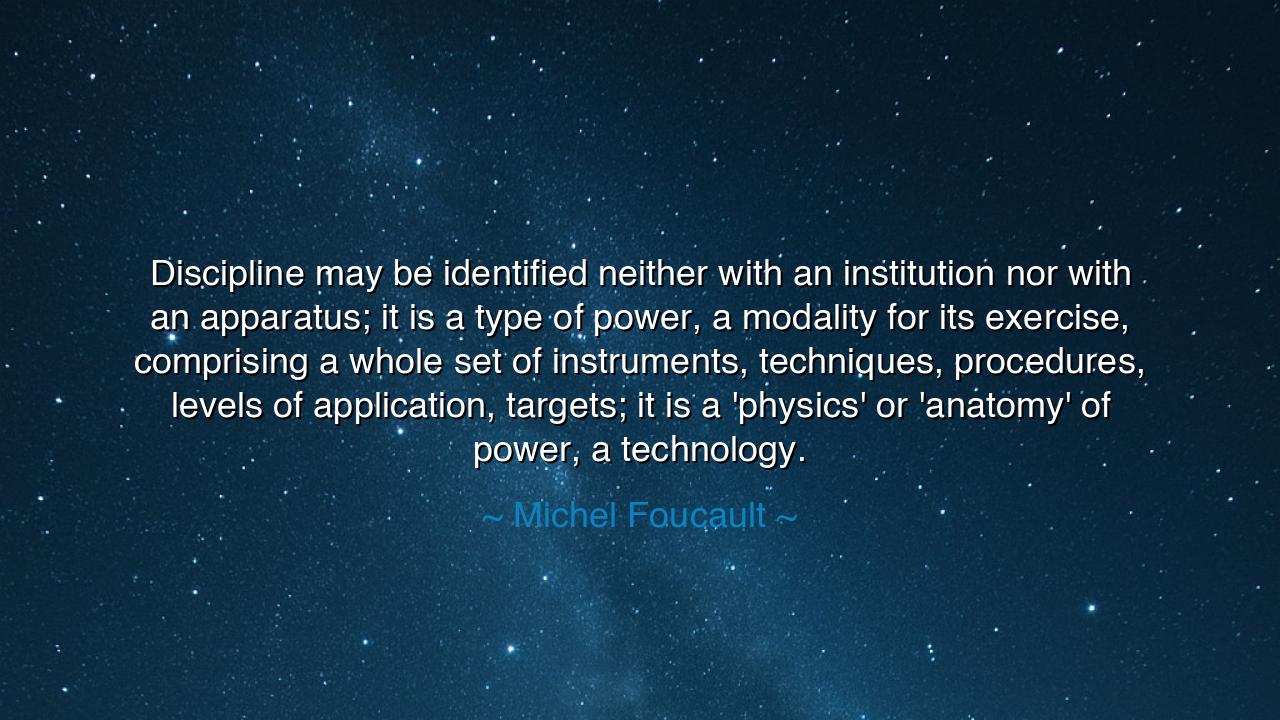
Discipline may be identified neither with an institution nor
Discipline may be identified neither with an institution nor with an apparatus; it is a type of power, a modality for its exercise, comprising a whole set of instruments, techniques, procedures, levels of application, targets; it is a 'physics' or 'anatomy' of power, a technology.






Hear the words of Michel Foucault, philosopher of power and historian of human order, who declared: “Discipline may be identified neither with an institution nor with an apparatus; it is a type of power, a modality for its exercise, comprising a whole set of instruments, techniques, procedures, levels of application, targets; it is a ‘physics’ or ‘anatomy’ of power, a technology.” These words are not light, but heavy as stone, meant to awaken the soul to the hidden forces that shape our lives. For discipline is not a mere school, nor a prison, nor an army—though it may be found in all three. It is a living current of power, a network unseen, that guides, constrains, and molds the body and the soul.
The origin of Foucault’s wisdom lies in his deep study of history, where he uncovered the secret patterns by which rulers, institutions, and societies maintained control. He saw that discipline was not tied to a single place or tool. Rather, it spread across the body politic like veins through flesh—appearing in schools where children learn obedience, in hospitals where the sick are catalogued, in armies where men march in unison, and in prisons where bodies are surveilled. It is not the building, but the pattern of control within the building. It is not the law, but the way the law penetrates the habits of life. Thus, he calls it a technology, an anatomy of power itself.
To grasp this truth, think upon the rise of the Prussian military in the eighteenth century. The strength of that army did not lie merely in weapons or fortresses, but in its discipline—the way soldiers were drilled until their movements became automatic, their wills absorbed into the greater will of the state. This discipline was a technology of power, shaping men not only in battle but in every gesture of life. And what began in the army spread into schools, factories, and governments, until entire societies were molded by the same logic: order, surveillance, regulation, precision.
So too in our modern age, though the forms have changed, the essence remains. Cameras on every corner, algorithms tracing every step, schedules carved into hours of labor—all these are not mere tools, but expressions of discipline. It is not the camera that rules, but the constant awareness of being watched. It is not the machine that commands, but the rhythm it imposes upon the worker. In this way, discipline becomes invisible yet omnipresent, guiding behavior more surely than chains or whips ever could.
What Foucault teaches is that this discipline is a power both subtle and immense. It does not scream, but whispers. It does not strike, but shapes. It enters into the very posture of the body, the habits of the mind, the order of time. It is a physics of power, as inexorable as gravity, bending men and women toward obedience even when no ruler stands above them. To know this is to awaken—to see that freedom is not only the absence of visible chains, but the awareness of the invisible ones.
Consider also the story of Jeremy Bentham’s Panopticon, a prison designed so that one guard could watch all, though unseen by the prisoners. The genius of this design was not the walls or the cells, but the way it placed surveillance inside the prisoner’s mind. Even when no one watched, he behaved as though watched. This is the purest image of discipline—power that governs without striking, authority that dwells not outside the man but within his own thoughts.
The lesson, then, is clear: you must learn to recognize the forms of discipline in your own age. Do not imagine it is only in prisons or armies—it is in the school that ranks its students, the workplace that measures every moment, the digital world that tracks every action. If you would remain free, you must see these forces, understand their methods, and refuse to let them swallow your soul.
Therefore, let your actions be thus: examine the patterns that govern you, question the routines imposed upon you, and learn to discern when discipline serves your growth and when it serves only control. For not all discipline is bondage—some is training, some is wisdom, some is the sharpening of the spirit. But when it becomes mere technology of power, stripping you of your humanity, then you must resist. Remember Foucault’s wisdom: to see power clearly is the first step toward freedom, for only the awakened can stand against the unseen hand.






AAdministratorAdministrator
Welcome, honored guests. Please leave a comment, we will respond soon